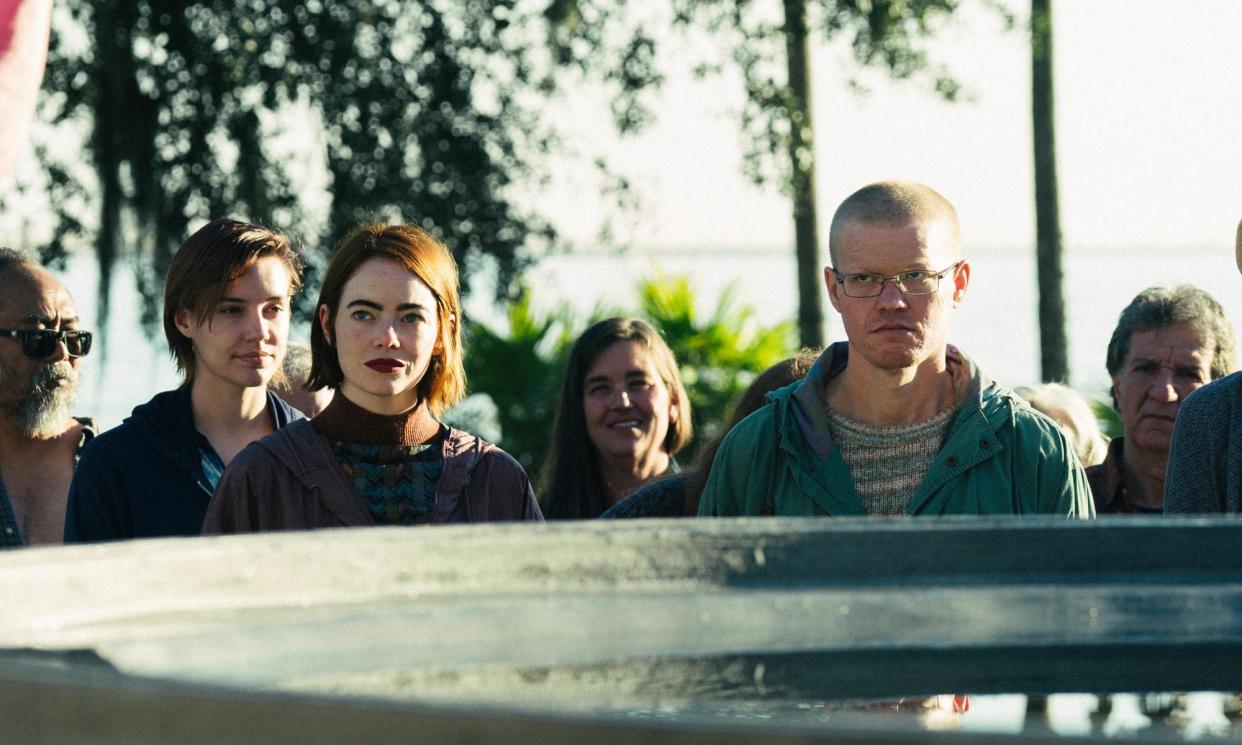Kinds of Kindness review – Yorgos Lanthimos reunites with Emma Stone for overlong but admirable triptych

Cannibalism. Auto-amputation. Obsession. Delusion. A glum, bearded, entirely silent man whose initials are RMF. Numerous themes and plot points are nipping away at the bones of Yorgos Lanthimos’s follow-up to Poor Things. An unwieldy triptych of not quite connected stories, starring the same repertory group of actors – Emma Stone, Jesse Plemons, Margaret Qualley, Willem Dafoe, Hong Chau, Mamoudou Athie and Joe Alwyn – in different roles in each of the three chapters, Kinds of Kindness leans back into the surreal cruelty and bizarro-banal logic of the director’s earlier films. Dogtooth is an obvious reference, but there’s also an element of The Lobster’s twisted relationship politics here.
But despite the recurring themes in the three stories, a unifying idea or central thesis that ties them together proves to be frustratingly elusive. Two things are undeniable, however. The first is that kindness of any kind is conspicuously absent in the film. The second is that Lanthimos is evidently fascinated (to a degree that may not be entirely healthy) with the idea of total control and subjugation of free will.
It’s a theme which was central in Dogtooth, his brilliantly uncomfortable 2009 breakthrough picture, in which an overbearing father keeps his three adult children unwitting prisoners in the family compound by creating an intricate mythology about the dangers of the world beyond the boundaries. And control, to varying degrees and various ends, links the three stories in Kinds of Kindness. It’s most overt as a story element in the first of the chapters, titled The Death Of RMF (RMF, played by Yorgos Stefanakos, is the only character who appears in all three of the stories, albeit obliquely).
The film is sporadically funny but it’s also emotionally arid and mannered
In this first chapter, Plemons brings a fretful discomfort to the role of Robert, playing him as the kind of person who never knows what to do with his arms when he poses for a photograph. For the last 10 years, Robert has willingly entered into an all-consuming contract with his boss and sometime lover Raymond (Dafoe). All decisions – from the clothes he wears and the food he eats, to his choice of wife and the frequency that they have intercourse – are made for him by Raymond, via instructions in a daily handwritten note. But when Robert refuses one of Raymond’s more extreme requests, Raymond abruptly severs the relationship, rescinding his favour and taking back his lavish presents of collectible sporting memorabilia. Robert’s life implodes after he confesses all to his wife, Sarah (Chau), who is understandably furious about her husband’s deception and his spineless acquiescence to Raymond’s demands (not to mention the loss of her favourite of all Raymond’s gifts, a smashed McEnroe tennis racket). Robert’s desperation to claw his way back into Raymond’s good books is sharpened when he begins to suspect that he has been replaced in Raymond’s affections by Rita (Stone).
Plemons and Stone are reunited in the second and least successful story (titled RMF is Flying), this time as Daniel, a cop whose mental health has hit a rough patch, and his wife, Liz, recently rescued after going missing on an ocean expedition. But Daniel’s initial relief soon turns sour as he starts to question whether the woman who has returned from her desert island ordeal actually is his wife. The control aspect in this story results from Daniel’s demands on his wife to prove herself and manifests itself in some robustly grisly body horror.
The third chapter (RMF Eats A Sandwich) follows cult members Andrew (Plemons) and Emily (Stone) as they search for a prophesied woman who can raise the dead, all the while jostling for position in the affections of the beatifically toxic cult leaders Omi (Dafoe) and Aka (Chau). For their part, Omi and Aka, like Raymond, make impossible demands on their followers, rewarding absolute submission with neatly portioned allocations of sex.
Having collaborated with screenwriter Tony McNamara on his two most recent films, The Favourite and Poor Things, here Lanthimos reunites with his long-term creative partner (co-writer on all Lanthimos’s films from Dogtooth until Killing Of A Sacred Deer) Efthimis Filippou. In common with those early collaborations, Kinds of Kindness is unapologetic in its ambiguity and oddness – and for that, you have to respect it. And the score, by Jerskin Fendrix, is admirably daring, combining discordant piano that sounds as though it was played by fighting cats, with hilariously portentous choral interludes.
But without the full-bore stylistic visual onslaught that oiled the wheels of Lanthimos’s last two films, Kinds of Kindness can feel rather a slog. The film is shot in and around New Orleans, but you wouldn’t know – urban anonymity replaces the vivid worlds created in his previous pictures. It’s impossible to endure all this – the film is sporadically funny but it’s also emotionally arid, mannered, and overlong – without making a link between the power plays on screen and Lanthimos’s approach as a film-maker. Directing, after all, is about control and in this case, we, the audience, are required to place ourselves in the hands of a film-maker who seems intent on testing our endurance, our patience and our pain levels. It’s not beyond the realms of possibility that, by watching the film, we become unwitting participants in Yorgos Lanthimos’s extravagantly conceived S&M scenario.
In UK and Irish cinemas now

 Yahoo Movies
Yahoo Movies 
